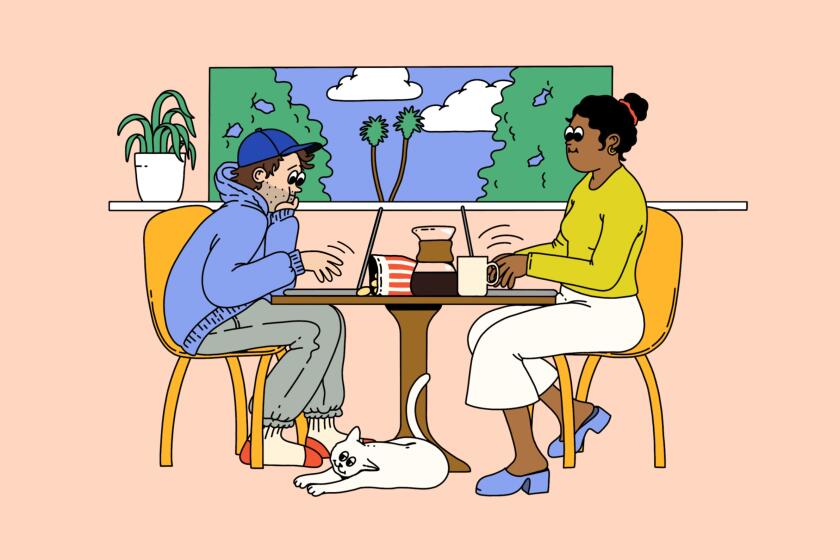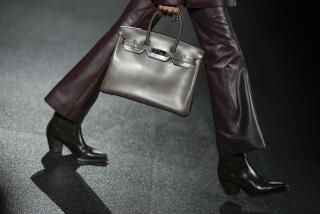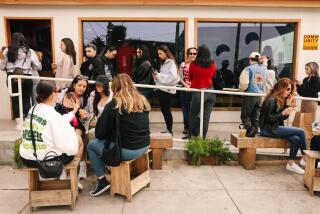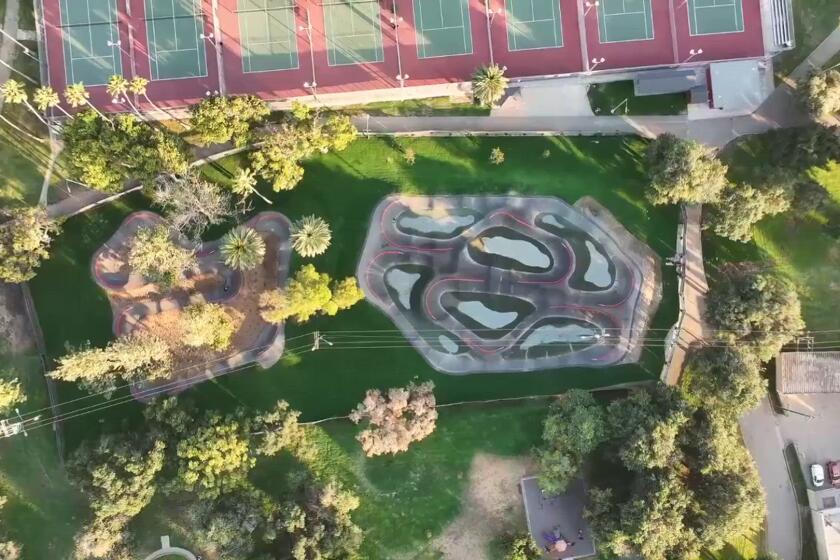What an online flea market looks like when Fred Segal does it. (Hint: Birkin bags included)
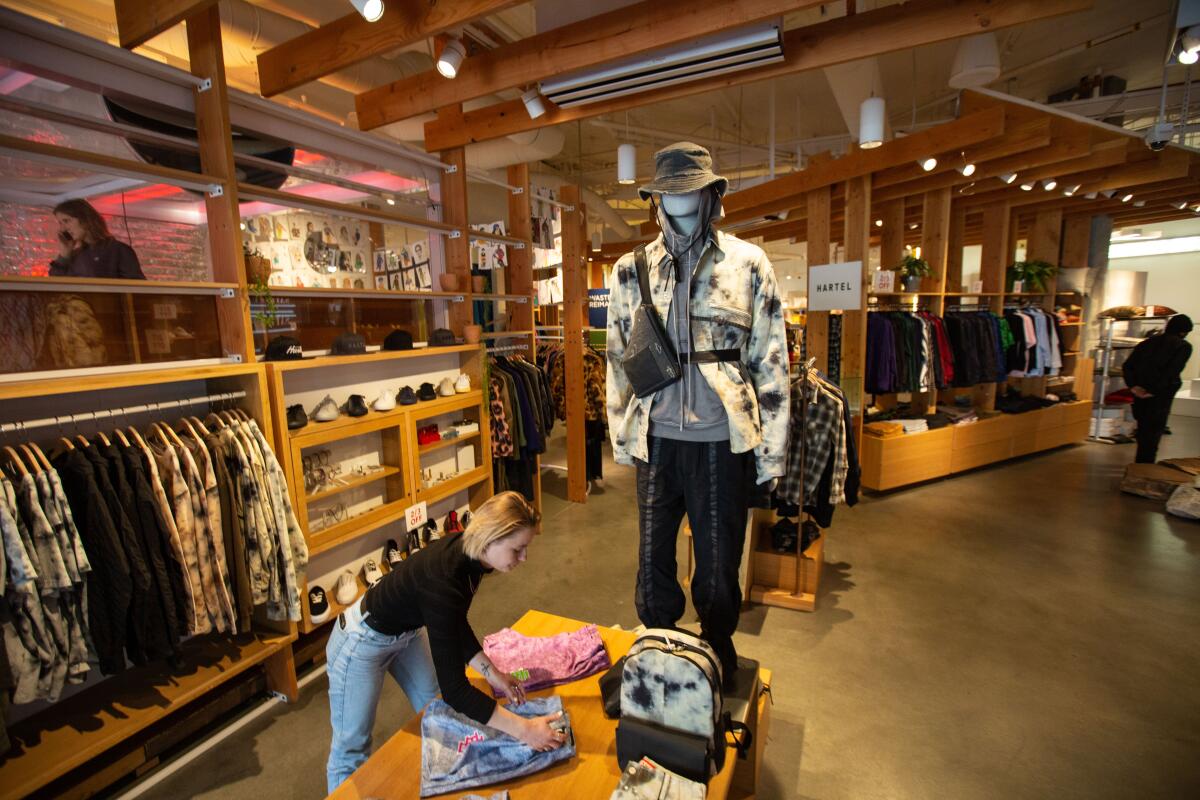
Just as Fred Segal Sunset was about to unveil its in-store flea market of vintage luxury goods last month, the world came screeching to a halt. The global coronavirus pandemic spiked in the U.S., causing officials in West Hollywood, L.A. and other parts of L.A. County to close nonessential businesses, including fashion retailers.
So the West Hollywood boutique, known for its breezy and casual selection of high-end designer goods, had to pivot — and fast.
That meant taking its swap-meet shop-in-shop concept, dubbed the Fred Segal Flea Market and styled like the popular Rose Bowl version, complete with canopy tents and metal rolling racks, and moving it online.
Max Feldmann, an assistant manager at the store who also owns Recess, a production company that specializes in retail pop-ups, had been spearheading the project.
“I’m pretty torn down the middle,” he said by phone this week, about seeing the immersive experience move to the two-dimensional digital realm. “I see the sales online and how much of an impact that creates. But being in store, seeing the client, seeing them appreciate the product, that means so much to me.”
But many industries suddenly have had to adapt, on the fly, to a new reality, and fashion is no exception. For Feldmann, 28, that meant tapping Fred Segal’s e-commerce team so they could photograph many of the one-of-a-kind vintage pieces and then make them available for purchase online.
Pro hair colorists and stylists in L.A. offer tips and tricks on how to best tend to hair growth during quarantine.
“At the end of the day, we all stick together and make it happen,” he said.
Now, a miscellany of eccentric goods — everything from a $43,000 brown crocodile Hermès Birkin bag to tissue-thin T-shirts that cost around $50 — can be purchased on fredsegal.com. A portion of the sales will go to hunger relief organization Feeding America. (Percentages range depending on each vintage vendor.)
When we met back in March, it had been the end of a stressful week for Feldmann. He had just a week to plan and execute the project after a scheduled pop-up shop collaborator pulled out at the last minute. Therefore, with seven days’ notice, he tapped into his network of vintage purveyors, scoured nearly 20 local thrift stores, plus 10 Goodwill stores, and drove a rented truck all over Los Angeles and Ventura counties to gather merchandise. It was all in the name of perfecting the mix of what would be available. As he was putting the finishing touches on the in-store experience, how could he know another, bigger, obstacle — COVID-19 — was on the horizon?
“The sourcing we did on this was extensive,” Feldmann said then.
And that remains true. Like a traditional flea market, Fred Segal’s version features merchandise from a variety of vintage vendors, each with their own specialization.
JC Churro of the brand FFF Postal Service, for example, is selling rare finds such as vintage Raf Simons and Jean Paul Gaultier. Saint Luis is offering rare T-shirts so thin they feel like they would disintegrate in your hand (a Mike Piazza-era Dodgers shirt will set you back $625), Levi’s cut-off shorts ($150) and a $1,200 pair of original Air Force 1s.
Feldmann, meanwhile, commissioned one-of-a-kind pieces upcycled from old garments such as $650 sweatpants made from bandannas.
There are vintage bags from Chanel and Hermès, plus timepieces such as a white-gold diamond-studded Cartier Ballon Bleu — going for a mere $29,000. Wear them for Zoom meetings or to dinners with your cat. Or dream of the day you can wear them in public — some future date when you can be less than six feet away from a stranger.
Although the flea market was a last-minute solution to fill empty space, the concept had been percolating in Feldmann’s mind for some time. Ideologically it overlapped with the concept of sustainability, which, until a month ago, was the biggest problem vexing the fashion industry. With the clothing trade wrestling with the negative impact of garment production on the planet’s resources, vintage has been rebranded as a more environmentally friendly option.
“The world is falling apart a little bit, so for me to sustain and do my job in the fashion industry, I feel that recycling products and keeping it elevated is key,” Feldmann said last month. “Keeping that mentality of saying, ‘Look, there’s a lot of great pieces that already exist in the world. People are willing to buy and trade inside the store.’ Why not create that atmosphere?”
Now, to the best of his ability, he’s re-created that energy online, and, in a funny way, this could benefit Fred Segal. A pop-up in a single location won’t necessarily get the same amount of traffic as putting the same assortment online for the whole world to browse, especially with everyone stuck at home with hours to peruse the web. And while traditional retailers are discounting their seasonal goods to move product in the face of a global economic downturn, suddenly the one-of-a-kind curated pieces offered at Fred Segal feel a bit special. (Feldmann said he was shocked to see three Chanel bags sold the first weekend of the online flea market.)
Why it’s time to put away the cargo shorts and yoga pants and find your shoes.
There might not be a definitive date for when Los Angeles County’s “Safer at Home” order will end, but Feldmann hopes the Fred Segal Flea Market will eventually make its way back into the real world over the summer.
“I’d love for our customers to experience this the way we envisioned it,” he said, “as an immersive experience.”
More to Read
Sign up for our L.A. Times Plants newsletter
At the start of each month, get a roundup of upcoming plant-related activities and events in Southern California, along with links to tips and articles you may have missed.
You may occasionally receive promotional content from the Los Angeles Times.
